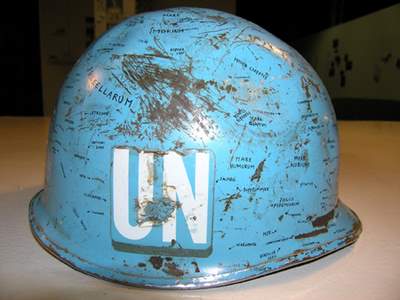Quo Vadis UN Peace Keeping?

"Tall trees catch a lotta wind", the saying goes. With cost of UN peace keeping operations now peaking at US$8 billion per year, no wonder the troubled UN department is front page news (again).
Deploying and supporting its record number of 113,000 staff, the blue helmets came into the press cross-fire (again) due to the most recent debacles in DRC and Darfur where they don't seem to have any direct positive impact on the peace process.
But one should look at both sides. It is all to easy to blame it on "the UN", as if it was some piece of soap in a bathtub: difficult to grab, and a generic nuisance. "The UN" does what its memberstates define what it should do. If member states only want a 'token' peace force in some country, a 'token' it will remain, despite best efforts on the ground.
Two pieces I recently read, at least tried, to see things in perspective. One from the New York Times:
More than a decade after United Nations peacekeepers failed to prevent massacres in Rwanda and Srebrenica, Bosnia, what many consider the organization’s flagship mission appears to be slouching toward crisis once again, diplomats and other experts say.And one from the book "Blood River" by Tim Butcher (more on this book in a later post):
The most immediate cause, they say, is a sharp rise in the number of peacekeeping commitments worldwide and a type of “mission creep” that has added myriad nation-building duties to the traditional task of trying to keep enemies apart. The new demands come at a time when member states with advanced armies in particular have become more resistant to committing additional troops or even necessary equipment like helicopters.
Those challenges have only added to a deeper and longstanding problem: the continued lack of clarity about how the United Nations should intervene when its members lack either the military force or the political will — or both — to halt carnage.
“Peacekeeping has been pushed to the wall,” said Bruce Jones, the director of the Center on International Cooperation at New York University, which is working with the United Nations on reform efforts. “There is a sense across the system that this is a mess — overburdened, underfunded, overstretched.” (Full)
I have seen numerous UN missions around the world, in Bosnia, Sierra Leone, Liberia and all over the Middle east. Each was castigated by the international media and commentators for being inefficient, bureaucratic and ineffective, but such criticism always misses the point.Picture courtesy genetologisch-onderzoek.nl
Yes, the missions are sloppy and poorly focused, but that is precisely because the international community's attitude to complicated problems like the collapsing Yugoslavia, or rampaging west African rebels, is sloppy and poorly focused.
When the United Nations Security Council addresses these international problems, the questions it ends up answering is not 'What is the right thing to do?' but 'What is the least we can do?'. UN missions around the world evolve at the pace of the lowest common denominator between the nations of the world, and that common denominator is pretty low when nations with interests as divergent as China and America both hold prominent positions in the UN Security Council.
 Peter. Flemish, European, aid worker, expeditioner, sailor, traveller, husband, father, friend, nutcase. Not necessarily in that order.
Peter. Flemish, European, aid worker, expeditioner, sailor, traveller, husband, father, friend, nutcase. Not necessarily in that order.
0 comments:
Post a Comment